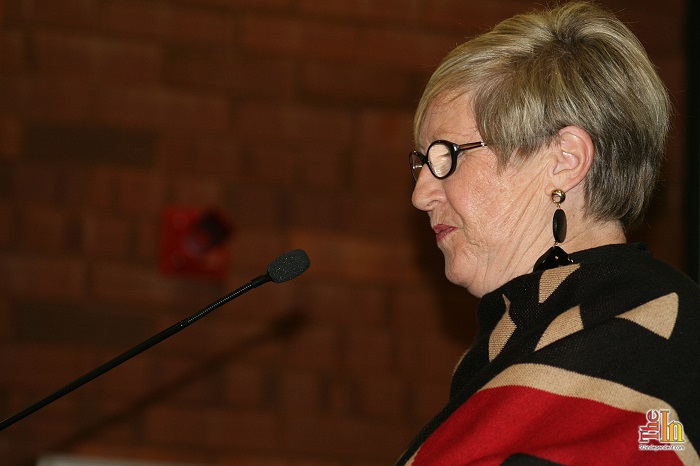How long have you lived in So. Utah; were you born here?
No, I was born in Orem, Utah, and graduated from Orem High School. We had lived in Hawaii for a couple of years and we came to St. George in 1983.
What drew you to the city?
My husband came with Christensen’s Department Store, when the shopping center in that southern part of town was first built. We came for work.
I can tell by looking at your resume, with experience serving on dozens of boards and commissions, your nonprofit work, your political involvement, that public service is an important part of your life.
Well it is, but I have to admit that necessity and serendipity played a big part. I needed to work and so I got jobs and these jobs provided me opportunity. I did them to the best of my ability — I tend to be a little OCD and maybe went beyond — but I relished every single experience. I’ve found that if I came into it that I was not prepared. I’m not prepared now. I don’t think you ever think you are fully prepared for it, but I applied myself and I felt humbled about what I was doing.
During my BLM and Congressman Hansen days, I had some really rich experiences. My dad had horses and I learned to ride, but I wasn’t an expert. (While working for the Department of the Interior as a public affairs specialist on the Arizona Strip) I found myself out on the land, kicking the manure with the ranchers and the federal employees, trying to figure out what to do, and riding horses. Those were things that maybe some people who know me wouldn’t imagine I would do.
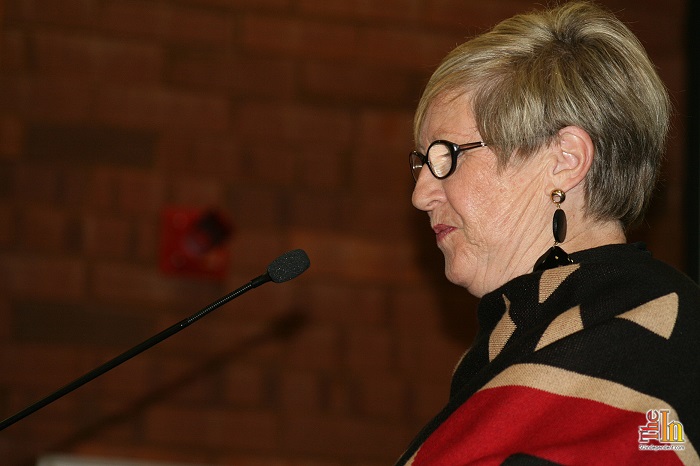
In her speech at the appointment hearing, former city council candidate Tara Dunn had some interesting and controversial things to say about the experience of non-Mormons in St. George. Setting aside the question of whether or not what she said is true, I feel like many people in St. George share her view. Do you think there is a cultural rift forming between some of the newer people that have come from outside the area and the people who have been here before?
I think that this is a very complicated issue that was dealt with in a very simplistic way. When we first moved here, what we heard was that if you weren’t from a certain little community, or ‘round-about, you would never fit in because the people who lived here were quite closed.
Well, in all fairness, from a historic standpoint, of course they were. This was probably one of the most isolated little places on the earth. It was hot and people avoided it. In the early ’30s, ‘40s and ‘50s, it was a place that was very, very isolated and people had to be hardy to survive. Of course they were closed and they were protective.
When people started coming in in the ‘60s and ’70s, of course there were growing pains, but you know what? We came to this town with the feeling that we wanted to come, and that we would love what we were going to experience here, and we have not felt, for one minute, anything but welcome.
I can’t speak for a town, a religion or even a congregation — I can’t speak for these people. I know that they inherently believe that it’s important to love and to reach out. I know that there are good people — I see them all around — that care about the new people moving in.
I think sometimes it’s the way we look at things, it’s the way we approach them. It’s not that everything’s perfect here. There are a lot of things that we can improve and do better and I hope that I can be an advocate for that and the people who come in a spirit of goodwill and want to work through things.
I don’t think calling names ever works, and if this community calls names and makes newcomers feel that way, I’m sorry because that’s wrong. It’s wrong for the newcomers and it’s wrong for the old-timers to do that, and I don’t find that’s productive or helpful and it does not move us forward.
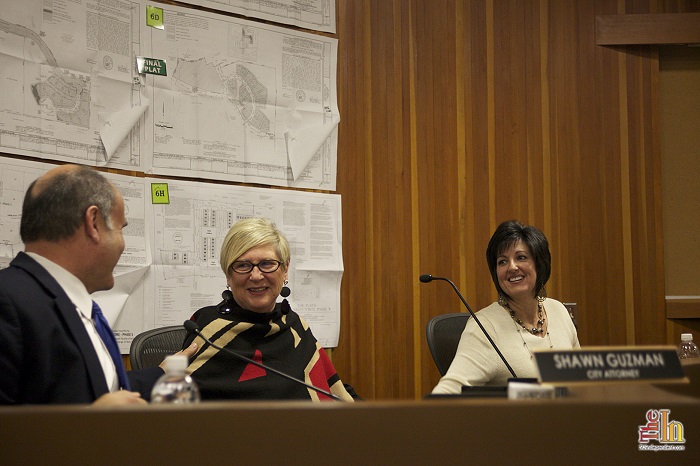
There has been a bit of controversy surrounding a group that you have been affiliated with. What is your role, if any, with the Sutherland Institute, and what are they all about?
I currently am not working for them. One of the jobs I had in Salt Lake was my Energy Solutions position. While I was there, I made it a point of policy to get to know everyone in that greater Salt Lake Community — it was in the best interests of my job as public relations vice president. I extended fundraisers and galas to both Democrats and Republicans, and civic and community events almost two or three times a week. That was the job, to get out into the community and to help people understand and to educate.
As a result, I was a member of the Utah Humanities Council and I attended many events that you would consider liberal, and many events that you would consider conservative. That is when I came into contact with the Sutherland Institute. I didn’t always agree with them and I didn’t always agree with the liberal groups that I attended, either, but I attended, I listened, I learned and I made associations.
When my husband and I decided to come to St. George, the Sutherland Institute contacted me and said, “If you are going down there, we need somebody to be a liaison for us, and to put together some programs.” They were mainly programs on the Utah State Constitution and programs about understanding ourselves better from The Arbinger Institute.
I said, “That’s great.” I needed a job and I had built bridges between these different groups in Salt Lake, so I thought that was good. I worked out of my home. I just put together “announce programs” (for) people who wanted to come and learn about the constitution that were held in the library.
They called me a Senior Advisor, which is a ridiculous title — I didn’t advise anyone and I actually resented the word “senior” because it sounded like I was old, but that’s what it was called. I had no policy position in any way.
I didn’t attend any meetings with them, but because they were associated with the voucher bill years ago that actually passed the legislature and was defeated by a ballot initiative, I was associated with that. When I ran for the State School Board, nobody asked me about that, but I was immediately labeled as a supporter of the voucher bill, and I was defeated in that effort, and I think that (my affiliation with The Sutherland Institute) played a big part in that.
I didn’t think it would rear its head in this race (to win the appointment to St. George City Council), as well, but immediately I was associated with anything that the institute had done. I don’t think that some of the things that they believe or do are helpful. They are controversial. I don’t necessarily personally have to agree with everything that they do. They are a very faceted and a very multi-issue kind of group, and in my mind it was unfair to lump me into a category of being a supporter of everything that they do.
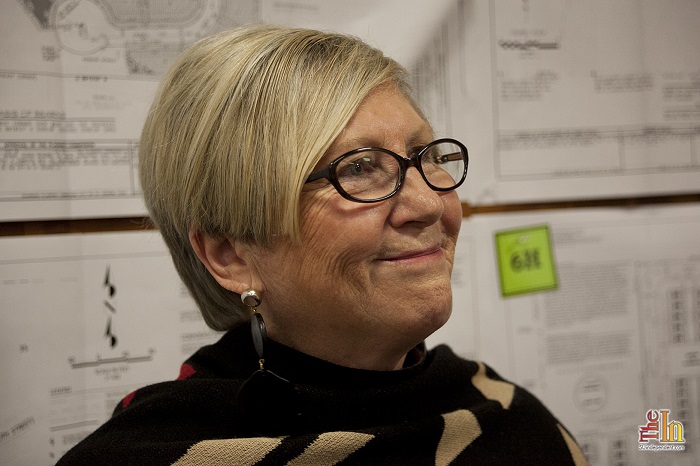
What is your stance on the Sutherland Institute’s position on LGBT issues, such as gay marriage and the non-discrimination bill? How do you feel about those issues?
Well, that’s a heavy one. My personal philosophy is that we love and care for all people. I have many, many friends who are gay, and I believe that very strongly. But I also believe that we all have the right to our personal feelings and our personal beliefs and religion and we need to respect both points of view. We need to do it in a civil, and a responsible, and an educated way.
Our culture should be evolved by now to a very high form, but I feel that we oftentimes go backwards. My ancestors came here because they were persecuted, but I never once heard that from anyone. My grandparents or my parents, I never once heard that. What I heard in my home was to be better, to try harder, to get education and to contribute.
Whenever I left the door, my dad said, “Have a wonderful time, but remember who you are.” It was an obligation that we reach to a higher level. That’s my personal philosophy.
The world is spinning so quickly that, Michael, I’m not sure what’s going on. We’ve never heard so much legalese in our media and our daily dose of news, probably in the history of the world. I don’t know how it’s all going to shake out — I don’t have the answers to that. But I do know that we need to respect each other, and we need to respect where people are coming from, and I think that if we do that, we can maybe get through some of these difficult times we are in.
As far as attaching me to another group, you could attach me to so many groups. I donated to the inclusion center — that’s definitely a gay group that talks to young people in Salt Lake and helps them to be inclusive, and lots of groups like that. To label me as an ultra-conservative, just on that one association — by the same token, I’ve donated to The Inclusion Center — is that going to label me as a gay rights advocate? I don’t know. I loved those people that I worked with. I guess it’s just too simplistic to me, and it’s unkind.
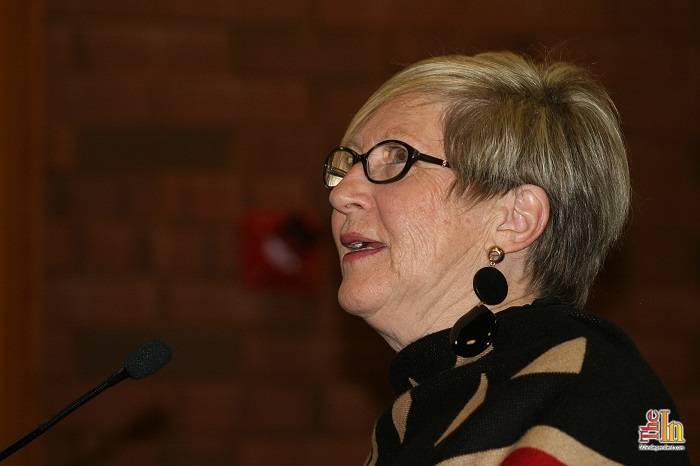
I read somewhere that you like to collect books and movies about World War II. Do you consider yourself a history buff?
I do.
Is that your favorite period of history?
Well, it is now. I’ve had different periods. I spent a lot of time being interested in the Civil War in high school and in early college. Yes, I’m drawn to it.
My father was very influential in my life and I believe that I drew characteristics from him, probably even maybe more than my mom. I watched him sit in a big, white leather chair in our living room and read history every chance that he got. I think that was very influential to me, and he loved to visit about the world events. He would read the paper to my mother while she prepared meals and we would all benefit from listening to their discussions.
They were from different political parties — my mother was a Democrat and my father was a Republican, so oftentimes they had completely different points of view, but they were gracious to each other and as a result the children in the family benefited from listening to him read about the current events that were taking place.
One of my favorites was the Kennedy-Nixon election. I was a young child, but I remember very much the passion they each had for their candidates.
World War II, to me, has come of age. Those veterans are dying at a very fast pace. They are going to be gone. I think it was a pivotal war in the history of the world and we need to remember it, and it’s coming back. History repeats and we need to know what the circumstances were and prevent things from happening again that happened then.
I do appreciate our local history, as well. I think that you probably heard me say that I’ve got six cotton mission ancestor families that I descend from and they are very important to me. I know their names and I know their spouses’ names; I know where they came from and why they came and what they gave up. They were incredible people and I feel them. To a certain extent, we came for work when we came here, but all of our family — our four children, my husband and I — we felt so privileged. We were drawn here, we wanted to come here.
I feel that the sacrifice of our ancestors to live here and settle this place and understand the difficulty of that has been very powerful. I feel a little twinge of guilt and obligation every time I wake up and see how glorious it is, knowing in the extreme heat and cold, people sacrificed for me.
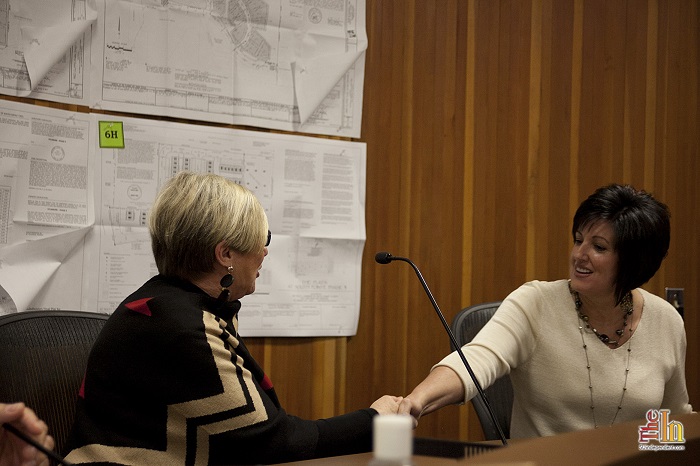
THE INDEPENDENT QUESTIONS:
What words would you like to have inscribed on your tombstone?
She came, she lived, and she died.
What would you like to accomplish in the next year?
Well, I’m sure that I’ll be on a very steep learning curve, but I hope to continue the great work as an arts advocate that councilmember Bunker has been so great at, and I hope that maybe we can find a new site for our homeless shelter.
Where do you see yourself in the next five years?
I see myself living here, contributing to this great community, and, hopefully, I’ll be in great health.
What is your favorite food?
Hands down, avocado. And if you really want to thrill me, you’ll put an artichoke in.
If you could be anybody, living or dead, who would it be and why?
There are so many people to chose from — as an aside, I would probably have loved to have been married to Cary Grant. I really admire (former Israeli prime minister) Golda Meir. She was an incredibly strong woman who realized that her physical attributes were not beautiful, but she was beautiful from within. She cared deeply about humanity and was one of the first female leaders of a free-world nation. I think she contributed greatly to our world.
SEE RELATED STORIES:
OPINION: The sun shines on Mormons and non-Mormons equally – so cut Tara Dunn some slack and cut the Mormons some, too
Tara Dunn speaks of city’s culture being “oppressive by design”; council appoints Bette Arial
BREAKING NEWS: St. George City Council appoints Bette Arial to fill Pike’s seat
TODAY’S THE DAY: Additional applicants respond as city council prepares to make its decision
WHO WILL IT BE? Responses from St. George City Council applicants (Part 2 of 3)
Who will fill Pike’s empty council seat? We’ve got the names of the applicants!
Baca and Dunn apply for Pike’s council seat
THE INDEPENDENT INTERVIEW: Age no limit for new St. George councilman Joe Bowcutt
THE INDEPENDENT INTERVIEW: Senator Urquhart talks medical marijuana, education and gay rights

